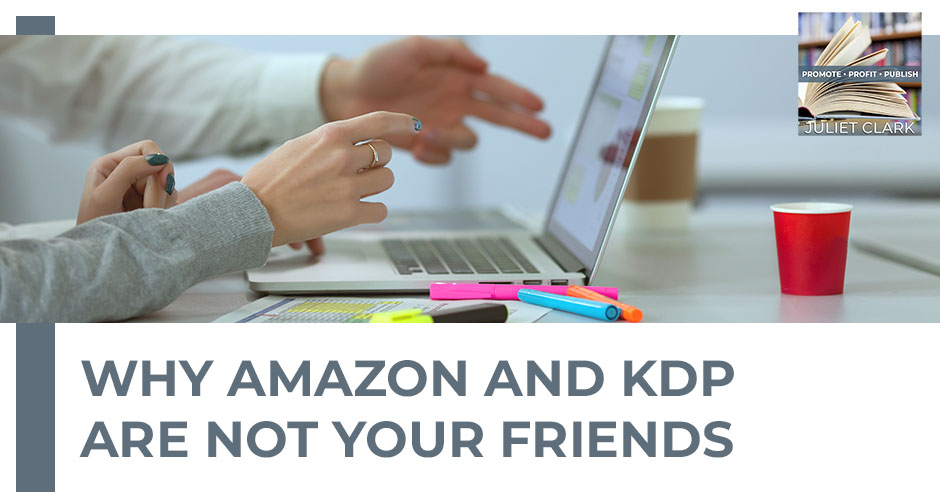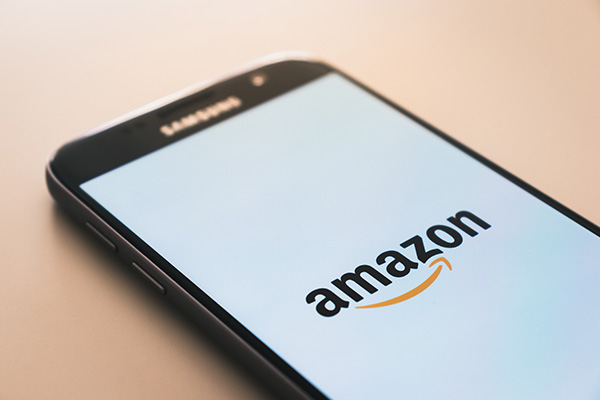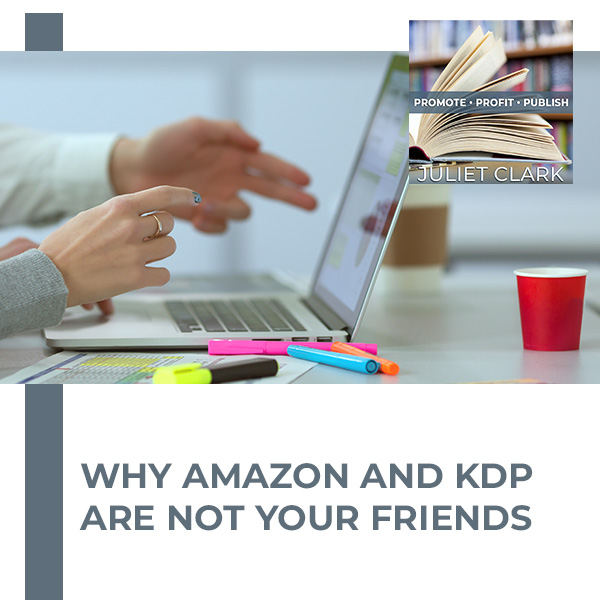
Self-publishing on Amazon and KDP may seem like the easy choice, but beware: they may not have your best interests in mind. Protect your author rights and take control of your publishing journey by avoiding the pitfalls and exploring alternative options. Join us for a solo episode where our host, Juliet Clark, dives into the world of self-publishing. Juliet discusses the potential pitfalls of publishing on Amazon and KDP. She shares several testimonials from people who have had a rough publishing journey with the aforementioned companies. Drawing from that, Juliet discusses how to protect your author rights, avoid common problems when publishing your book, and more. She also provides tips on how and where to publish your book to get the best results as an author and business partner. Tune in now and discover how to take control of your publishing journey.
Grab a copy of Breakthrough Author Magazine at BreakthroughAuthorMagazine.com.
If you’re thinking about publishing a book, and you’re not quite sure, check out AuthorTrafficSchool.com.
Other Resources Mentioned:
Amazon KDP Terminated My Account and Deleted My Book. Here’s What I Did! by Chris Ducker
—
Watch the episode here
Listen to the podcast here
Why Amazon And KDP Are NOT Your Friends
Welcome to the show. There is no guest for this episode. You just have me. The topic is going to be something that if you are thinking about publishing a book in the future, or you have, you may want to think about republishing it and also how to avoid the problems with Amazon. Before we get started, I do want to remind you to go over and grab a copy of Breakthrough Author Magazine. You can find it at BreakthroughAuthorMagazine.com. The subscription is completely free. Once you subscribe, it will drop into your inbox on the first of every month.
The wonderful thing about the magazine is if you are in book development or you are building a platform or getting ready to publish, there are lots of tips and tricks there from experts who not only build those for you or help you build them, but also, most of them are published authors themselves. They have been through this process. They understand how to do it.
If you’re thinking about publishing a book and you’re not quite sure, and you don’t know how to build that platform in advance so you have an audience, I encourage you to go over and check out Author Traffic School. You can find it at AuthorTrafficSchool.com. We work with everyone from beginning businesses all the way up to people who are a little bit more digitally familiar. We are teaching them how to get up and get started. Books are sold online, so you have to have a strong online presence.
A funny thing happened. I usually listen to podcasts when I’m running in the office or when I have spare time. That’s my entertainment since I rarely watch TV. Many years ago, I believe back in 2016 or 2017, I subscribed to Chris Ducker. Chris Ducker runs something called Youpreneur. He is very successful at this. I don’t listen every day like I used to. I used to be quite a fan girl, but I outgrew it. I don’t know what to say why I don’t listen all the time.
This episode about Amazon and his experience with Amazon caught my eye. I listened and reached out. I got permission to share his podcast with you. What he was talking about in this is that while Chris Ducker is plenty big enough and has, in the past, gotten himself traditional publishing contracts, he went out and was having an event. He took a book for the event. It sold extremely well.
What he did with that book was he decided to publish it on Amazon. He needed it, and he needed it quickly. For those of you who have gone through the traditional track, it takes anywhere from 18 months to 3 years to go from getting that contract to publication. He wanted something he wanted quickly. This was a smart way for him to go, which is putting it up in KDP Amazon.
I do want to make it clear that he is selling books. This is not somebody who published a book back in 2019 and 2020 and after the initial push didn’t sell books. He mentions in the podcast that he sold a significant number. I believe it was over 3,000 books in January of 2023. This book wasn’t obsolete. It wasn’t like it was still selling. He’s been selling them all along after the initial push, but there was something going on. This was a big push.
All of a sudden, he got an email from Amazon. When you listen to the podcast, you’ll understand the gist. They said, “Your account is canceled. We’re holding the royalties that you earn.” With Amazon, you get paid 60 days after the close of the month. Imagine that he had sold over 3,000 books in January 2023 and then the month closed. He should have gotten paid at the end of March 2023, but they decided to withhold those royalties. If that had been me, I would’ve gotten an attorney.
He’s an extremely patient man. I could tell he was irked, but he was patient. I probably, knowing what I know about Amazon, would’ve gone straight to the attorney function of this. They’re withholding his money. They’ve told him that his book is being taken down, his account is being canceled, and he may never publish another book again. Think about that. That’s crazy.
He has patiently gone through this process where he has written them emails and has gotten canned answers. For anybody who’s worked with Amazon, and I’m going to get into this, which is probably not going to be popular, from a publisher’s standpoint, Amazon is a nightmare. They consider themselves a publisher and a distributor.
Amazon is a nightmare. They consider themselves a publisher and a distributor. Share on XThe way we use Amazon as a publisher is much different from most other publishers out there. The first thing we do is put our soft covers. For many of our eBooks and our hardcovers, we use Lightning Source Ingram. We take that Kindle file and set it up under the author’s name. What makes us different in that sense is we don’t take any of your backend profits.
It doesn’t bother us that we’re setting up the Kindle in your name. We do it because Amazon plays so many games with books that are not published through them. What I mean by that is the books will appear, they will disappear, or the price will be reduced. No other platform that we use does that. No other distributor we use plays games like that. It’s mostly because they honor the print-on-demand. They don’t need to reduce the price. They can take their 55% and run, and it’s great.
With that said, we used to set up for our authors. We still do, but we set it up under their current Amazon accounts. What we used to do was we would set up a Gmail account. It might be JulietClarkAuthor@gmail.com. We did that so that during the best-seller campaigns, Amazon would not play games with our product. They usually don’t bother their own product. We would do that, and then as they’re playing games, I could jump into the KDP and tell them, “We’ve got these things going on.”
The reason that we used to do that with a separate email that was not your Amazon account was for several reasons. First of all, for most entrepreneurs who write books, the tax information goes to their business, not their personal. Think about this. I have a personal account with Amazon. I jump on and I order vacuum cleaner parts or whatever it was. I don’t want that charged to my business account, so I’ve got credit cards inside my actual Amazon account. I’ve got shipping addresses. I’ve got everything inside my Amazon account for directly someone to go in and if they went in there to commit identification fraud or ID fraud.

Self Publishing On Amazon: For most entrepreneurs who write books, the tax information goes to their business account, not their personal account.
When we were setting these up, we would go over and set up a Gmail. The business information was put in along with the tax information and the banking information so our clients could get paid directly. It would come out at the end of the year. The 1099 would be to our business, not to our personal. The other advantage of this is sometimes, there was a credit card in that Gmail account that we had set up through KDP, and sometimes not. It depended on whether our client or bookseller was doing advertising.
We had a good system going with that. My staff could go in. They could upload books, make adjustments, and run ads. For all of the client information that was in there, there had to be a text message if we went into that part of the account, which we never did. The problem is that they changed that. We now have to use our clients’ Amazon accounts to do this, which is fine. We still go in and put that other information. Here’s the bad part. We have your logins for Amazon. We have access to your personal credit cards for ordering stuff. There are all sorts of fraud that can take place, and we did that.
When we switched to that, it created a situation where I pulled that part of the business away from my staff. It’s not that I don’t trust my staff, but anything that has to do with money has to go through me as the CEO of the company, which means that I don’t give them access. I rarely have access. Our clients pay through QuickBooks or HoneyBook. I never see a credit card. There’s no situation where someone like an author can come back and say, “You defrauded me. You used my credit card. You stole this. You charged that.” We are blind to it. With the way Amazon is set up in your Amazon account, if I let my staff do that, they would have access to all of that. That’s not a good thing in the world of identity theft.

Self Publishing On Amazon: With the way Amazon is set up in your Amazon account, they would have access to all of your data. That’s not a good thing in the world of identity theft.
That’s one of the changes that was made. I suspect that. I do not have actual data here and neither does Mr. Ducker. Why do I say that? It’s because they will not tell him why they canceled his account. This very patient man has gone back and forth with Amazon and just send him canned stuff. He got a supervisor and he still got canned messages. This is a bad situation when Amazon goes in and they cancel your book, and they say, “Never.”
This was to explain why we do this the way we do. I would love for you to listen to Chris Ducker’s episode of this because you’ll find he’s been pretty darn patient with them. What concerns me most is the holding of the royalties. If I held your royalties as your publisher, you’d sue me in a minute. If you had the kind of book sales that Mr. Ducker has, you would sue me in about 30 seconds. That’s a significant amount of money, probably not to him, but to most businesses, it’s a good amount of money.
What is the lesson in all of this that I want to communicate to you? The lesson is to be sure you distribute with companies that won’t do this. Amazon is famous for playing games. When I run an Amazon bestseller campaign or when I put a book into my client’s accounts and see that games are being played with the soft covers and the hardcovers coming in, I will jump in in your name and write an email. I’ll say, “We’ve got a problem here.” 10 out of 10 times, they will come back and tell me it’s my problem. I know well it’s not my problem. It’s them playing games.
I then go back to Ingram Lightning Source. Ingram Lightning Source throws up its hands and says, “We can’t control Amazon.” I have a disclosure in my contract that says we cannot control what the distributors do, and it’s for Amazon because none of the other distributors do this. Where I was going with that was, first of all, to make sure that you have the broadest distribution possible. Make sure that your publisher has you on Books-A-Million, Apple, Nook, and Barnes & Noble.
Basic packages will get you in Barnes & Noble soft cover and Amazon. Most basic packages will, but they won’t have that Nook component. The Nook component comes from another distribution source that we put into place where we load your book. Be sure it’s on Apple. Be sure it’s on Google. Be sure it’s in Walmart, Target, and all those other places like libraries and academics. Make it available to as many as possible.
When we use this other platform, your book goes out to over 100 distributors. We can put in there, “Do not send to Amazon.” That’s what we do since we set up our own authors in Amazon Kindle for them to get their own money straight from Kindle. That is the lesson from all of this. 1) Make sure you’re using a publisher that has the widest distributorship possible. 2) Understand. Don’t yell at your publisher when you see Amazon playing games. We have no control over them. I can’t even stress enough that we have no control.
Here’s another thing that irks me about Amazon. I understand from an accounting standpoint, but I don’t understand from the standpoint of you have consumers that are very unhappy. Many times, when we run an Amazon bestseller campaign, we have enough sales that Amazon will order and warehouse our soft covers. Instead of returning them, which most authors would prefer, they will discount them.
I get calls at least a dozen times a year from an author who will say, “My book is $19.99, and now it’s selling for $6.99 on Amazon.” That’s because they warehoused your book. They bought your book. You got paid full-boat royalty for it, but instead of returning it, they discount it on their end. Always remember that the distributors have 55% of the retail price to work with. When they warehouse it, they’re giving up their profit.
Always remember that the distributors have 55% of the retail price to work with. When they warehouse it, they're giving up their profit. Share on XIt’s irksome to an entrepreneurial author to have their book discounted. The reason is it devalues their work. It makes their work unimportant. It makes their work seem like it’s cheapened. Keep in mind all of this when you are working with a publisher or even when you publish a book yourself. There are so many ins and outs of the publishing business and the backend of it that you don’t understand.
I understand when my authors call and they’re upset. It’s because they don’t understand the backend of it. As much as we disclose, there is still that backend that you don’t understand. Most of you as entrepreneurs, you’re in the business of your expertise, not my expertise. It really is important, and because of that, we have developed a disclosure process the whole way along. That is so that when we go to print, you understand that these changes are going to cost you money and we do not have any control over what Amazon does.
We think their business practices are abysmal. The people sell books there. The other thing is the royalties. We get down and explain the royalties. We’re like, “This is how it works. This is when you will get paid.” Still, even with the disclosures, people come back and go, “I got a statement, but I didn’t get paid.” I have to tell them, “Let’s go through this again so you can see.”
I encourage you to go listen to it. I hate to say this, but when I heard him describing what was going on, I heard for probably the first time that Amazon is willing to mess with its own customers. It’s a shame because it’s not good customer service. Amazon has never had good customer service. You get a lot of canned messages.
Think about this. That customer service, if I had to guess, might be a minimum waged $20-an-hour job. They probably go through a lot of people. They don’t understand the book industry. They don’t understand anything. It’s like my twenty-year-old kid going in and going, “I’m working in Amazon,” but he knows nothing about the world or customer service. It doesn’t seem like they’re trained. That’s one of the lessons.
The other lesson is when you read this, you’re going to learn about the frustration that US publishers go through every single day with Amazon. I’m going to give you a baseline here. When I started this company in 2010, I rarely had a customer service complaint to Lightning Source. Everything was taken care of. I maybe talked to them. This is when I could pick up the phone, talk to them, and get a problem solved in real-time maybe twice a year. Even conceding that, we have grown tremendously through there.
Throughout that time, Amazon has become the worst ever. When we go to Lightning Source, we have to do it by email. It used to be in 2020. I believe they went to chat. In 2019, it went from phone to chat. Chat was okay. You still got somebody in real-time. Now, it is email. They promise within 24 to 48 hours. Sometimes, I get an answer a week later, and we’re trying to release a book, so everybody in the system is overwhelmed.
What happens is we get this disconnect between Ingram Lightning Source and Amazon. I get to the point where I have to share the emails that they’re both giving me and say, “Somebody solved this before I have to get an attorney involved.” Please go listen to Chris Decker’s podcast. I hope this was helpful in understanding how unhelpful it is for you to publish your own books on Amazon because you don’t know the rules and you don’t know the industry. You do need professional help. Thank you. I’ll see you in the next episode.
Important Links
- BreakthroughAuthorMagazine.com
- AuthorTrafficSchool.com
- Youpreneur
- Episode – Amazon KDP Terminated My Account and Deleted My Book. Here’s What I Did!
Love the show? Subscribe, rate, review, and share!









Leave A Comment